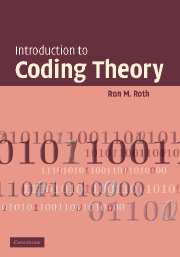Book contents
- Frontmatter
- Contents
- Preface
- 1 Introduction
- 2 Linear Codes
- 3 Introduction to Finite Fields
- 4 Bounds on the Parameters of Codes
- 5 Reed–Solomon and Related Codes
- 6 Decoding of Reed–Solomon Codes
- 7 Structure of Finite Fields
- 8 Cyclic Codes
- 9 List Decoding of Reed–Solomon Codes
- 10 Codes in the Lee Metric
- 11 MDS Codes
- 12 Concatenated Codes
- 13 Graph Codes
- 14 Trellis and Convolutional Codes
- Appendix: Basics in Modern Algebra
- Bibliography
- List of Symbols
- Index
3 - Introduction to Finite Fields
Published online by Cambridge University Press: 05 June 2012
- Frontmatter
- Contents
- Preface
- 1 Introduction
- 2 Linear Codes
- 3 Introduction to Finite Fields
- 4 Bounds on the Parameters of Codes
- 5 Reed–Solomon and Related Codes
- 6 Decoding of Reed–Solomon Codes
- 7 Structure of Finite Fields
- 8 Cyclic Codes
- 9 List Decoding of Reed–Solomon Codes
- 10 Codes in the Lee Metric
- 11 MDS Codes
- 12 Concatenated Codes
- 13 Graph Codes
- 14 Trellis and Convolutional Codes
- Appendix: Basics in Modern Algebra
- Bibliography
- List of Symbols
- Index
Summary
For most of this chapter, we deviate from our study of codes to become acquainted with the algebraic concept of finite fields. These objects will serve as our primary tool for constructing codes in upcoming chapters. As a motivating example, we present at the end of this chapter a construction of a double-error-correcting binary code, whose description and analysis make use of finite fields. This construction will turn out to be a special case of a more general family of codes, to be discussed in Section 5.5.
Among the properties of finite fields that we cover in this chapter, we show that the multiplicative group of a finite field is cyclic; this property, in turn, suggests a method for implementing the arithmetic operations in finite fields of moderate sizes through look-up tables, akin to logarithm tables. We also prove that the size of any finite field must be a power of a prime and that this necessary condition is also sufficient, that is, every power of a prime is a size of some finite field. The practical significance of the latter property is manifested particularly through the special case of the prime 2, since in most coding applications, the data is sub-divided into symbols—e.g., bytes—that belong to alphabets whose sizes are powers of 2.
Prime fields
For a prime p, we let GF(p) (Galois field of size p) denote the ring of integer residues modulo p (this ring is also denoted by ℤp).
Information
- Type
- Chapter
- Information
- Introduction to Coding Theory , pp. 50 - 92Publisher: Cambridge University PressPrint publication year: 2006
Accessibility standard: Unknown
Why this information is here
This section outlines the accessibility features of this content - including support for screen readers, full keyboard navigation and high-contrast display options. This may not be relevant for you.Accessibility Information
- 1
- Cited by
